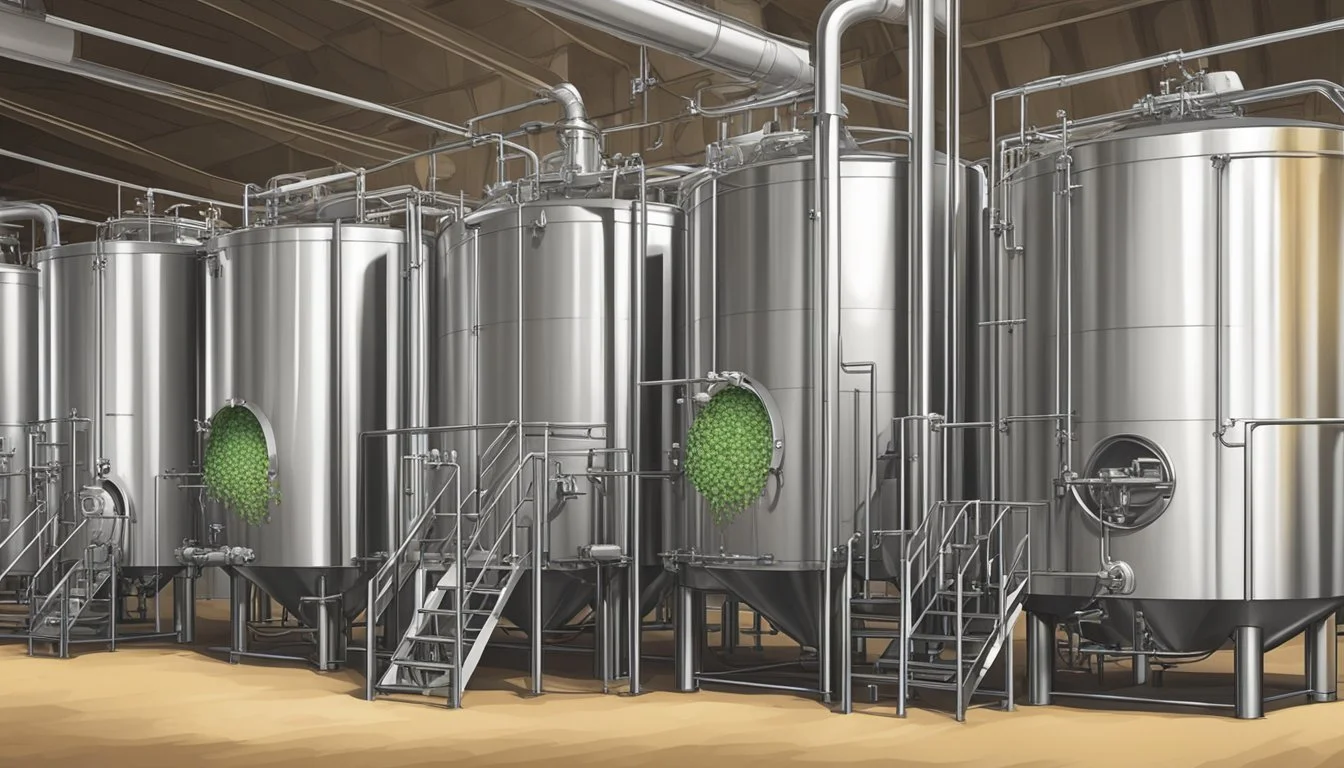Is Beer Gluten-Free?
Understanding Your Options and Alternatives
Traditional beer is brewed from malted barley, wheat, or rye, all of which contain gluten. Gluten is a group of proteins found in these grains that can cause health problems for individuals with celiac disease or gluten sensitivity. In recent years, there has been a growing demand for gluten-free options, leading to the production of beers that are safe for those avoiding gluten.
To be labeled gluten-free, beers must meet strict criteria. In many countries, including the United States, gluten-free beers must contain less than 20 parts per million (ppm) of gluten. This threshold is considered to be safe for most people with celiac disease. Gluten-free beers are made using gluten-free grains such as sorghum, rice, millet, corn, or buckwheat, ensuring that the final product is naturally free from gluten.
While gluten-free beers provide a safe alternative for those with dietary restrictions, it's important to distinguish them from "gluten-removed" or "gluten-reduced" beers. These are beers made from traditional gluten-containing grains that are processed to remove gluten to some extent, but may still contain traces that could be harmful to individuals with celiac disease or gluten intolerance. Consumers must carefully read labels and understand the differences between gluten-free and gluten-reduced beers to make informed choices that align with their health needs.
Understanding Gluten and Its Effects
This section of the article focuses on the essential details about gluten, its role in conditions like celiac disease and gluten sensitivity, and the various health effects it can have on individuals.
The Basics of Gluten
Gluten is a family of proteins found primarily in wheat, barley, and rye. It acts as a binder, holding food together and giving it a stretchy quality. For most people, gluten is harmless, but for some, it can trigger adverse reactions.
Celiac Disease and Gluten Sensitivity
Celiac disease is an autoimmune disorder wherein the ingestion of gluten leads to damage in the small intestine. Gluten sensitivity, also known as non-celiac gluten sensitivity (NCGS), refers to a condition where individuals experience symptoms related to gluten consumption, but without the intestinal damage seen in celiac disease.
Symptoms common to both include:
Stomach pain
Diarrhea
Weight loss
Other gastrointestinal issues
Effects of Gluten on Health
For individuals with celiac disease or gluten sensitivity, consuming gluten can lead to a range of symptoms, from mild discomfort to severe health issues. It's important for those affected to avoid gluten-containing foods to prevent these negative health outcomes.
The Brewing Process of Beer
The brewing process of beer is a critical factor in determining whether it contains gluten. Traditional beers incorporate gluten-containing grains, but gluten-free brewing methods and alternative grains enable the production of beers suitable for those with gluten sensitivities.
Traditional Ingredients
The conventional beer brewing process typically utilizes grains like barley, wheat, and rye as the primary sources of sugar. These grains contain gluten, a group of proteins which can be problematic for individuals with celiac disease or gluten intolerance. During brewing, the gluten content in these grains, which can largely surpass 20 parts per million (ppm), the threshold for gluten-free labeling, impacts the gluten levels in the final alcoholic beverage. Yeast is then introduced to the sugary liquid, known as wort, to initiate fermentation, converting sugars into alcohol and carbon dioxide.
Gluten-Free Brewing Techniques
Gluten-free brewing departs from traditional methods by either excluding gluten from the start or by reducing gluten content post-brewing. Techniques vary from using gluten-free grains or enzymes that break down gluten to a level that meets regulatory standards for gluten-free labeling. These processes require careful attention to avoid cross-contamination if brewed in facilities that also process gluten-containing beers.
Alternative Grains in Gluten-Free Beer
To produce gluten-free beer, brewers turn to alternative grain sources that do not contain gluten. Notable among these is sorghum, as it imparts a traditional malt flavor without gluten. Other gluten-free grains used can include:
Rice: Often used for its fermentable sugars and light flavor.
Millet: Valued for its malt-like taste.
Buckwheat: Despite its name, it is not related to wheat and is gluten-free.
Corn: Provides a sweet flavor and is a common adjunct in brewing.
These grains must still undergo the typical brewing steps of mashing, lautering, boiling, fermenting, conditioning, and filtering to become beer. Gluten-free yeasts are selected to avoid all exposure to gluten, ensuring that the brewing process maintains its gluten-free integrity from start to finish.
Clarifying Gluten-Free vs. Gluten-Removed Beers
Navigating the world of beer for those with gluten sensitivities involves understanding the distinction between gluten-free and gluten-removed beers. The safety and compliance with standards for each type vary, impacting the choices for individuals with celiac disease or gluten intolerance.
Gluten-Free Beers
Gluten-free beers are brewed exclusively with ingredients that do not contain gluten from the start. These ingredients may include grains like sorghum, rice, or corn. By definition, these beers must contain less than 20 parts per million (ppm) of gluten, which is the threshold set by the U.S. Food and Drug Administration (FDA) for products labeled as gluten-free. Proteins from wheat, barley, or rye are absent in the brewing process, making these beers a safer choice for celiacs.
Ingredients Used:
Sorghum
Rice
Corn
Other non-gluten grains
FDA Compliance:
< 20 ppm of gluten
Safe for individuals with celiac disease
Gluten-Removed and Gluten-Reduced Beers
Gluten-removed and gluten-reduced beers start as traditional beers brewed with gluten-containing grains like barley. An enzyme process, often involving Brewers Clarex, is then utilized to break down gluten into smaller fragments. Theoretically, these fragments are small enough not to trigger an immune response in people with gluten sensitivities. However, there is some debate about their safety for those with celiac disease, as there are no standardized testing methods that all agree upon to measure the gluten content after the enzyme treatment.
The term "gluten-removed" suggests that the beer has been processed to reduce the gluten content below the FDA's 20 ppm standard. Nevertheless, due to variations in testing and individual reactions, the immune response in celiac patients can vary.
Production Process:
Starts with traditional gluten-containing grains
Enzyme treatment to break down gluten
Aimed to be under 20 ppm gluten
Considerations:
Safety for celiacs is debated
Variability in testing methods and individual tolerance
Understanding Labeling Standards
The labeling of beer concerning gluten content falls under the regulation of the FDA and the Alcohol and Tobacco Tax and Trade Bureau (TTB). For a beer to be labeled as "gluten-free," it must meet the FDA standard of containing less than 20 ppm of gluten. Beers that are labeled as "gluten-removed" or "gluten-reduced" may not meet the strict criteria for a gluten-free label because they are derived from gluten-containing grains, despite processed to lower their gluten content. Customers need to distinguish between these labels to make informed decisions based on their level of sensitivity or celiac disease.
Label Types:
Gluten-Free: Must adhere to FDA under 20 ppm standard.
Gluten-Removed/Reduced: Not always accepted as safe for celiacs due to initial gluten content.
Regulatory Bodies:
FDA
TTB
consumers need to carefully check labels and may need to consult with a healthcare provider to ascertain which type of beer aligns with their dietary needs.
Safety and Regulation of Gluten-Free Beers
When evaluating the safety and regulation of gluten-free beers, it's essential to consider FDA guidelines, precise gluten content testing methods, and the importance of official gluten-free certification.
FDA Regulations
The Food and Drug Administration (FDA) stipulates that products labeled as "gluten-free" must contain less than 20 parts per million (ppm) of gluten. This threshold is considered safe for most individuals with celiac disease. Gluten-free beers must adhere to this standard, and any product labeled as such is subject to FDA regulation to ensure consumer safety.
Gluten Content Testing Methods
Monitoring gluten content is critical for beer manufacturers to ensure compliance with "gluten-free" labeling. Reliable testing methods, such as the Enzyme-linked Immunosorbent Assay (ELISA) and PCR testing, are employed to measure the gluten peptides in the beers. These methods help in determining whether the beers meet the required FDA standards for gluten levels.
Gluten-Free Certification
Beyond FDA regulation, additional gluten-free certification from independent organizations can lend credibility and assurance to the safety of the beer for gluten-sensitive consumers. To gain certification, breweries must undergo a rigorous process, including regular facility audits and product testing, to verify the absence of cross-contamination and that they meet the strict gluten-free criteria.
Gluten-Free Beer Varieties and Styles
Gluten-free beer options cater to those sensitive to gluten without compromising on taste and variety. They are meticulously brewed to either completely eliminate or significantly reduce gluten content, ensuring that beer enthusiasts with dietary restrictions can enjoy a pint too.
Ales and Lagers
Gluten-free beers span across both ales and lagers, offering a range of styles and profiles. Ales, often characterized by a more robust and fruity flavor due to top-fermenting yeast, are commonly available as gluten-free options. These may include American pale ale and golden ale, each presenting unique flavor notes from the selected hops.
Lagers, which are typically fermented at cooler temperatures, are also an option in the gluten-free market. Their clean and crisp taste appeals to those who prefer a milder beer. Regardless of the type, gluten-free ales and lagers maintain the essential taste characteristics that are expected of traditional beers.
Popular Gluten-Free Beer Brands and Breweries
Several breweries have established themselves in the gluten-free beer market. Here are some notable brands:
Ghostfish Brewing Company: This brewery specializes in a wide array of gluten-free beers, such as their Grapefruit IPA and American pale ale.
Glutenberg: Glutenberg offers an extensive selection, including their Blonde Ale and IPA.
Anheuser-Busch: Known for their Redbridge Beer, Anheuser-Busch provides a lager that's brewed with sorghum.
Stone Brewing: They offer the Delicious IPA, which has a bold hop presence and is reduced in gluten.
These brands exemplify commitment to the craft of gluten-free brewing, employing alternative grains like millet, rice, and sorghum to replace traditional barley and wheat. The result is a range of tasting experiences, from the hop-heavy IPAs to the light and refreshing Belgian-style ales, which are packed with flavor and are accessible to gluten-sensitive beer drinkers.
Consumer Considerations for Gluten-Free Beers
When exploring the realm of gluten-free beers, consumers should focus on how these alternatives compare to traditional beers in taste and how to select the right product for their needs without compromising on quality.
Taste and Quality Comparisons
Gluten-free beers are crafted to offer a similar tasting experience to traditional beers, utilizing gluten-free grains like sorghum, rice, and buckwheat. These ingredients create variance in flavor profiles, making it essential for consumers to sample different gluten-free options to find their preferred taste. The brewing community acknowledges the challenge of emulating the full-bodied taste of beers like lagers, IPAs, and stouts. However, some breweries have managed to produce gluten-free beers that closely match the flavor complexity of their gluten-containing counterparts.
Lagers: Typically known for their clean and crisp taste, gluten-free versions may slightly differ but still provide a light, refreshing alternative.
IPAs: The hop-centric character of traditional IPAs can be preserved in gluten-free options, offering consumers a similar bitterness and aroma.
Stouts: Rich and roasted flavors are more challenging to replicate, but some gluten-free stouts achieve this by using alternative grains and flavor enhancers.
Navigating the Beer Selection
Choosing a gluten-free beer involves understanding the labeling and knowing the difference between "gluten-free" and "gluten-removed" or "gluten-reduced" beers. In some regions, beers with less than 20 parts per million (ppm) of gluten can be labeled as "gluten-free," although consumers with celiac disease or heightened sensitivities should proceed with caution. Gluten-removed beers are treated with enzymes to break down gluten and may not be safe for all individuals. Consumers seeking truly gluten-free options should look for beers that are:
Brewed with 100% gluten-free ingredients
Produced in facilities dedicated to gluten-free brewing to avoid cross-contamination
A practical approach to navigate the selection is to start with beers labeled as "certified gluten-free," ensuring the product meets strict standards for gluten content and handling.
Impact of Gluten-Free Beer on Diet and Lifestyle
The rise of gluten-free beer options provides alternatives for individuals following a gluten-free diet and affects the nutritional landscape of alcoholic beverages. Understanding its role in diet and lifestyle requires examining its inclusion in a gluten-free diet and the nutritional content of these beers.
Gluten-Free Diet Inclusion
Gluten-free beer is crucial for those who adhere to a gluten-free diet due to celiac disease or non-celiac gluten sensitivity. This diet eliminates all forms of gluten, which is a protein found in wheat, barley, and rye. Gluten-free beers are typically made using gluten-free grains such as sorghum, buckwheat, or rice, eliminating the risk of gluten exposure. Inclusion of gluten-free beer allows individuals to enjoy alcoholic beverages without compromising their dietary restrictions. It should be noted, however, that products labeled as "gluten-removed" may not be entirely safe for all individuals on a gluten-free diet due to the potential for trace amounts of gluten remaining.
Nutritional Aspects of Gluten-Free Beers
Nutritionally, gluten-free beers tend to differ from their traditional counterparts due mainly to the alternative grains used in their production. Gluten-free grains bring a different profile of nutrients to the beer:
Gluten-Free Grain Notable Nutrients Sorghum Antioxidants, Iron, Dietary Fiber Buckwheat High-quality Protein, Fiber, B Vitamins Rice B Vitamins, Magnesium, Selenium
Consumers should be aware that gluten-free beers may have varying caloric contents as well. A thorough label inspection is recommended to understand the beer's nutrient contribution to their overall diet. It is important for consumers to recognize that while gluten-free beers accommodate dietary restrictions, they should still be consumed in moderation as part of a balanced diet.
Global and Regional Gluten-Free Beer Markets
The gluten-free beer market has been expanding globally, with notable growth particularly in North America where brands and consumers have been actively pushing the industry forward.
United States
The United States has seen a substantial rise in demand for gluten-free beers, as evidenced by the introduction of gluten-free brands and products designed to cater to those with celiac disease or gluten sensitivities. A pioneer in this niche is Anheuser-Busch's Redbridge, which was one of the first widely available gluten-free beers in the country. Moreover, dedicated gluten-free breweries such as Holidaily Brewing Co. in Colorado have become increasingly popular for their exclusive use of gluten-free ingredients, including malted millet. Breweries like Stone Brewing have also made waves with offerings such as the Delicious IPA, denoting a significant push even by larger, established breweries into the gluten-free category.
Notable Gluten-Free Brands in the US:
Redbridge by Anheuser-Busch
Bard's
New Planet
Omission Lager (crafted to remove gluten)
Stone Brewing Delicious IPA
Ghostfish Brewing Company
Canada and International Markets
Canada, in tandem with international markets, has been displaying a healthy appetite for gluten-free beer products. The inclination towards specialty beers like Damm Daura and Green's gluten-free range reflects the broader market's pursuit of variety as well as dietary-specific beers. Canadian macro brews are also entering the space with Prairie Path, a beer labeled gluten-free, contributing to the diversifying market.
Outside of North America, Europe and Australia, among other regions, continue to foster growth through both local craft labels and expansions by global beer manufacturers. There's a concerted effort to meet consumer expectations for taste and variety, challenging the perception of gluten-free beers and winning over a broader audience.
Significant Markets and International Gluten-Free Brands:
Canada: Embraces gluten-free options such as Prairie Path.
Spain: Home to Damm Daura, a well-recognized gluten-free beer.
Belgium: Known for Green's, a variety of gluten-free beers.
Global companies: Increasingly introducing gluten-free options to meet market demands.
The Future of Gluten-Free Beer
The landscape of gluten-free beer is experiencing a positive transformation, with advancements in brewing techniques and a rising consumer base driving its evolution.
Innovations in Gluten-Free Brewing
As the demand for gluten-free options soars, breweries are responding with cutting-edge brewing processes and alternative ingredients. Pioneers like Ghostfish Brewery have embraced grains like millet, buckwheat, and brown rice, which inherently lack gluten. Brewers Clarex, an enzyme, has become instrumental in crafting gluten-reduced beers by breaking down gluten proteins, although these are distinct from 100% gluten-free beers. Innovation in gluten-free brewing not only diversifies the beer profile but also ensures greater safety for gluten-intolerant consumers. Burning Brothers Brewing and Omission Brewing are also at the forefront, implementing new techniques to elevate the quality and taste of gluten-free beer, aligning the experience more closely with that of traditional beers.
Market Growth and Consumer Demand
Market analyses predict a continual surge in gluten-free beer popularity. Driven by consumer demand, the number of dedicated gluten-free breweries is on the rise. Statistics indicate that the global gluten-free beer market is expected to grow significantly in the coming years, with North America and Europe being key players. As awareness increases and more consumers seek out gluten-free products, the assortment and availability of gluten-free beers will likely expand, further stimulating market growth. This demand isn't solely propelled by those with medical conditions like Celiac disease, but also by health-conscious individuals choosing to reduce gluten in their diets.







